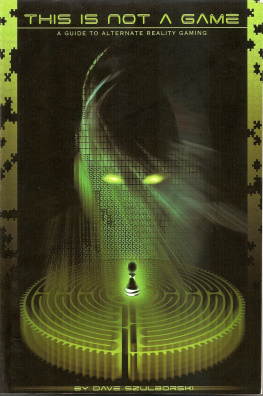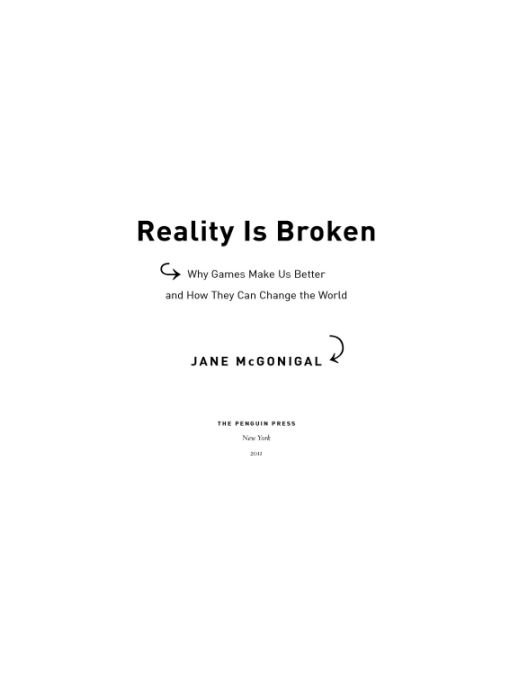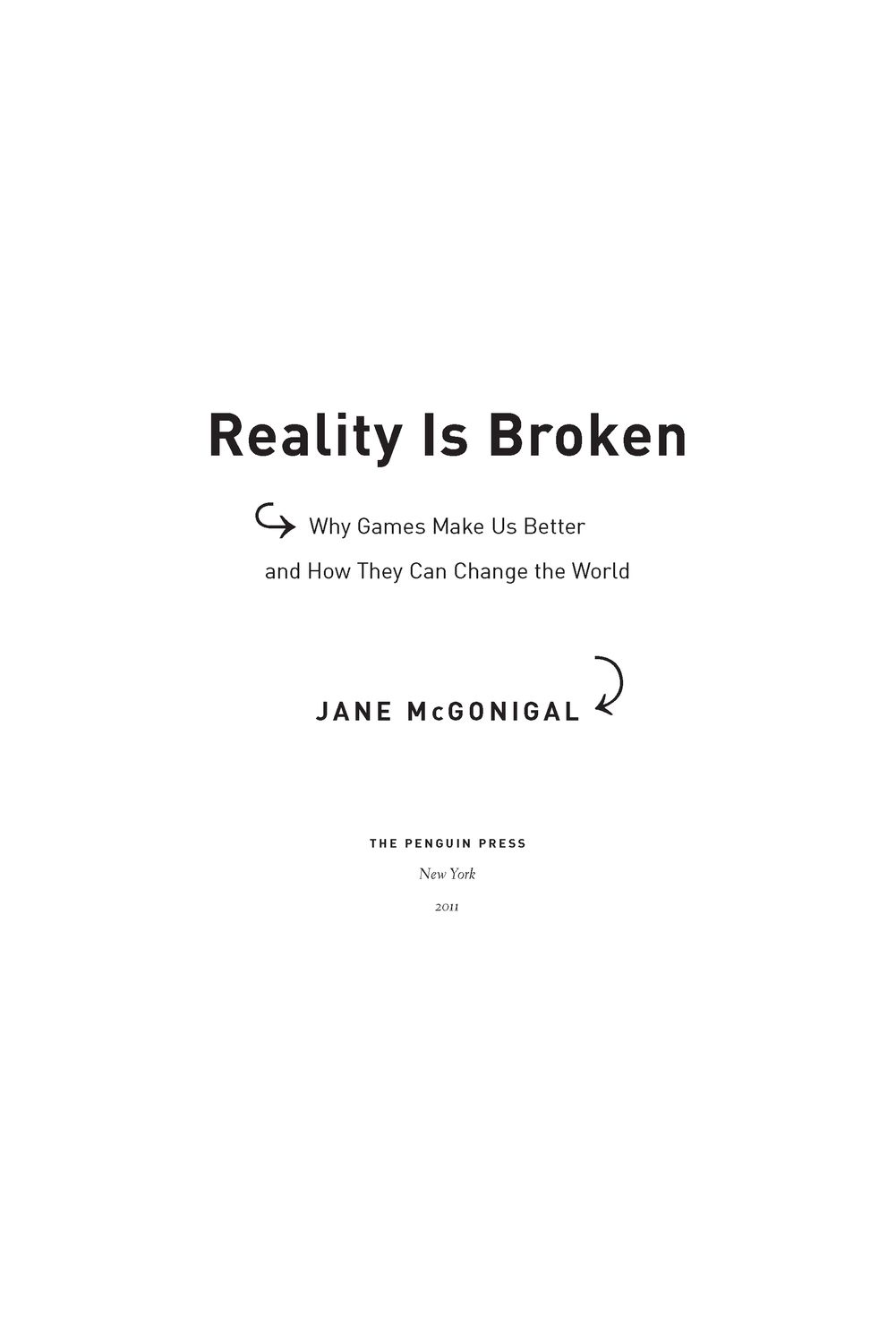Table of Contents
ADVANCE PRAISE FOR
Reality Is Broken
Forget everything you know, or think you know, about online gaming. Like a blast of fresh air, Reality Is Broken blows away the tired stereotypes and reminds us that the human instinct to play can be harnessed for the greater good. With a stirring blend of energy, wisdom, and idealism, Jane McGonigal shows us how to start saving the world one game at a time.
Carl Honor, author of In Praise of Slowness and Under Pressure
Reality Is Broken is the most eye-opening book I read this year. With awe-inspiring expertise, clarity of thought, and engrossing writing style, Jane McGonigal cleanly exploded every misconception Ive ever had about games and gaming. If you thought that games are for kids, that games are squandered time, or that games are dangerously isolating, addictive, unproductive, and escapist, you are in for a giant surprise!
Sonja Lyubomirsky, Ph.D., professor of psychology at the University of California, Riverside, and author of The How of Happiness: A Scientific Approach to Getting the Life You Want
Reality Is Broken will both stimulate your brain and stir your soul. Once you read this remarkable book, youll never look at gamesor yourselfquite the same way.
Daniel H. Pink, author of Drive and A Whole New Mind
The path to becoming happier, improving your business, and saving the world might be one and the same: understanding how the worlds best games work. Think learning about Halo cant help your life or your company? Think again.
Timothy Ferriss, author of the #1 New York Times bestseller The 4-Hour Workweek
Jane McGonigals uncanny vision and snappy writing give all of us a plausible glimpse of a positive human future, and of how gamingof all thingswill take us there.
Martin Seligman, author of Flourish and Authentic Happiness
The world has no shortage of creative people with interesting ideas. What it lacks is people who can apply them in ways that really make a difference, and inspire others to do the same. Jane McGonigal is the rare person who delivers on both. Once you start thinking about games as happiness engines, and the ways that our lives, our schools, our businesses, and our communities can become more gamefulmore fulfilling, more engaging, and more productiveyoull see possibilities for changing the real world that youd never imagined.
Tony Hsieh, author of the #1 New York Times bestseller Delivering Happiness and CEO of Zappos.com, Inc.
Jane McGonigals work has helped define a new medium, one that blends reality and fantasy and puts the lie to the idea that there is such a thing as fictionwe live every story we experience and we become every game we play. Her insights in Reality Is Broken have the elegant, compact, deadly simplicity of plutonium, and the same explosive force.
Cory Doctorow, author of Little Brother and coeditor of Boing Boing
Jane McGonigals groundbreaking research offers a surprising solution to how we can build stronger communities and collaborate at extreme scales: by playing bigger and better games. And no one knows more about how to design world-changing games than McGonigal. Reality Is Broken is essential reading for anyone who wants to play a hand in inventing a better future.
Jimmy Wales, founder of Wikipedia
Wonder why we love games? McGonigal has written the best take yet on the deep joys of playand how to use that force for good. Reality Is Broken is a rare beast: a book thats both philosophically rich and completely practical. It will change the way you see the world.
Clive Thompson, contributing writer for The New York Times Magazine and Wired
for my husband, Kiyash,
who is better at every game than I am,
except for Werewolf
It is games that give us something to do when there is nothing to do. We thus call games pastimes and regard them as trifling fillers of the interstices of our lives. But they are much more important than that. They are clues to the future. And their serious cultivation now is perhaps our only salvation.
BERNARD SUITS, philosopher
INTRODUCTION
Reality Is Broken
Anyone who sees a hurricane coming should warn others. I see a hurricane coming.
Over the next generation or two, ever larger numbers of people, hundreds of millions, will become immersed in virtual worlds and online games. While we are playing, things we used to do on the outside, in reality, wont be happening anymore, or wont be happening in the same way. You cant pull millions of person-hours out of a society without creating an atmospheric-level event.
If it happens in a generation, I think the twenty-first century will see a social cataclysm larger than that caused by cars, radios, and TV, combined.... The exodus of these people from the real world, from our normal daily life, will create a change in social climate that makes global warming look like a tempest in a teacup.
EDWARD CASTRONOVA,
Exodus to the Virtual World
Gamers have had enough of reality.
They are abandoning it in drovesa few hours here, an entire weekend there, sometimes every spare minute of every day for stretches at a timein favor of simulated environments and online games. Maybe you are one of these gamers. If not, then you definitely know some of them.
Who are they? They are the nine-to-fivers who come home and apply all of the smarts and talents that are underutilized at work to plan and coordinate complex raids and quests in massively multiplayer online games like Final Fantasy XI and the Lineage worlds. Theyre the music lovers who have invested hundreds of dollars on plastic Rock Band and Guitar Hero instruments and spent night after night rehearsing, in order to become virtuosos of video game performance.
Theyre the World of Warcraft fans who are so intent on mastering the challenges of their favorite game that, collectively, theyve written a quarter of a million wiki articles on the WoWWikicreating the single largest wiki after Wikipedia. Theyre the Brain Age and Mario Kart players who take handheld game consoles everywhere they go, sneaking in short puzzles, races, and minigames as often as possible, and as a result nearly eliminating mental downtime from their lives.
Theyre the United States troops stationed overseas who dedicate so many hours a week to burnishing their Halo 3 in-game service record that earning virtual combat medals is widely known as the most popular activity for off-duty soldiers. Theyre the young adults in China who have spent so much play money, or QQ coins, on magical swords and other powerful game objects that the Peoples Bank of China intervened to prevent the devaluation of the yuan, Chinas real-world currency.
Most of all, theyre the kids and teenagers worldwide who would rather spend hours in front of just about any computer game or video game than do anything else.
These gamers arent rejecting reality entirely. They have jobs, goals, schoolwork, families, commitments, and real lives that they care about. But as they devote more and more of their free time to game worlds, the


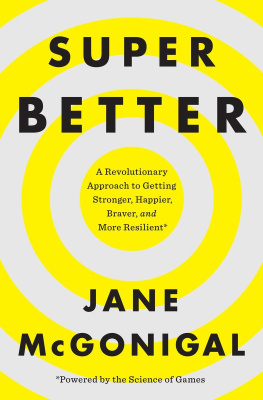
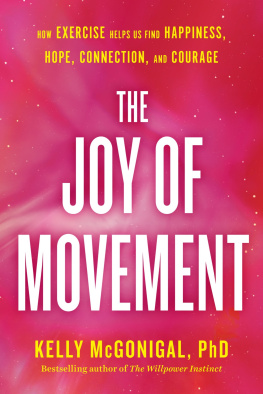
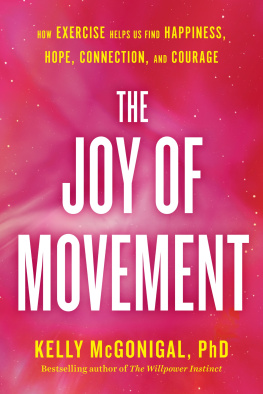
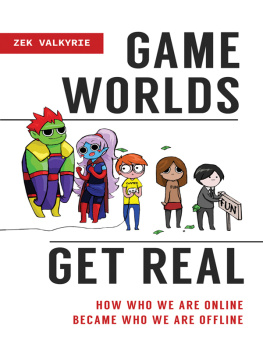
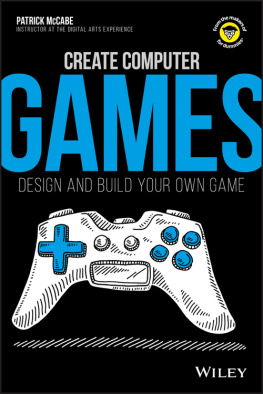
![Chris Bateman [Chris Bateman] - Beyond Game Design: Nine Steps Toward Creating Better Videogames](/uploads/posts/book/119409/thumbs/chris-bateman-chris-bateman-beyond-game-design.jpg)
